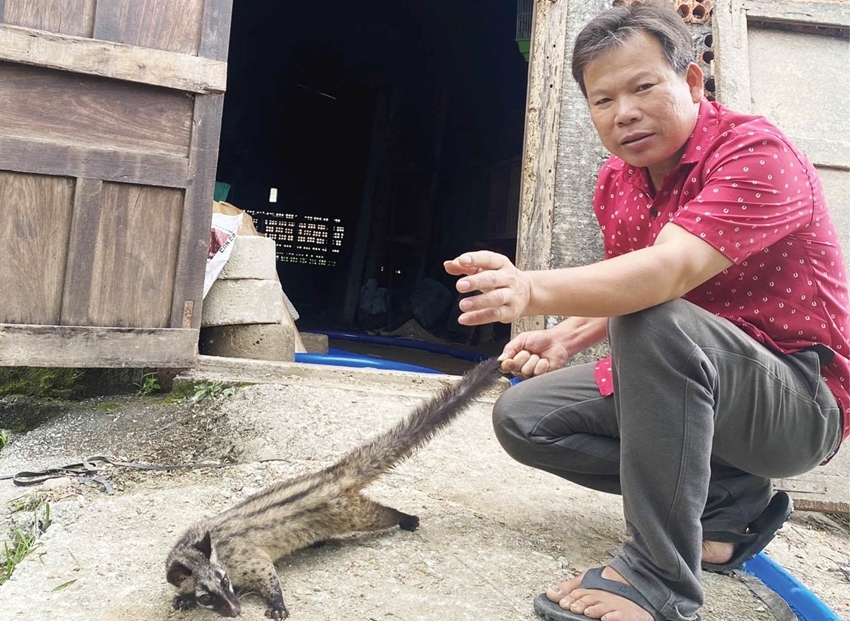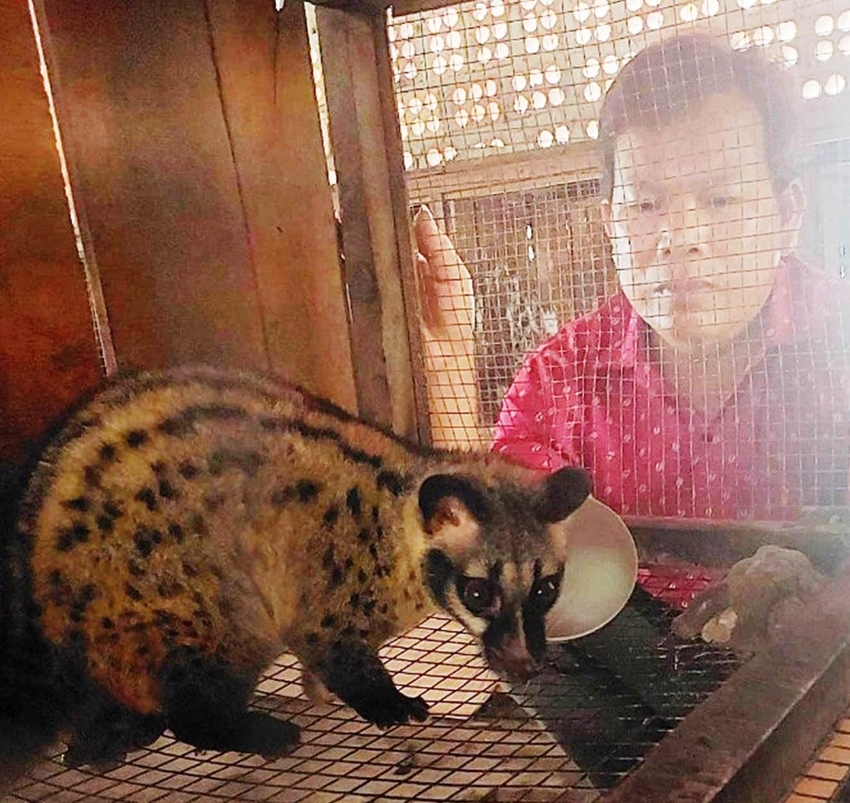    |
 |
| Quang’s closest and dearest Asian Palm civet |
Repairing a cage with an iron frame for the civets that about to give birth, Mr. Quang was in the joy of having new members. However, he was still mixed with sadness when a civet had recently died of a heat shock due to a sudden and erratic weather change.
Although raising wildlife animals is never an easy task, Mr. Quang is always worried and pitiful whenever a civet gets sick or dies. If a civet “dies”, he loses his sleep.
More than 8 years of raising this rare civet is not a long time, but for Mr. Quang, it is enough to experience sadness, happiness and unforgettable memories. From his initial days of borrowing dozens of millions to buy some civets from Binh Phuoc province just to satisfy his passion, to watching a TV program that showed successful farming establishments in raising civets and gaining economic benefits, he was determined to buy a few more pairs to raise.
Even though he had proof documents concerning the origin of the legal civet breed, Mr. Quang still struggled many nights due to his limited understanding about the law. Sharing his story of civet farming to a forest ranger, Mr. Quang was guided through the process and procedures of registering wild animal raising. He then felt released with the rare animal raising license in hands.
    |
 |
| The Asian Palm civets like to live in the dark |
From the original 12 pairs of parent civets, after only three years, the civets were raised to 60 mothers and nearly 130 commercial cubs. Mr. Quang reserves his entire garden, which is hundreds of square meters wide, for raising civets because they have a very quick reproduction. Each female can reproduce in each litter of 4-5 baby civets. With normal and stable weather conditions, their survival rate is over 70%.
It is not easy for an Asian Palm civet to have high fertility. It requires caregivers like Mr. Quang to regularly monitor and grasp each growth stage and the female individual’s estrus. Female civets are usually in their estrus for two days, when they must be forced to mate with the male ones. If one is over this period, it can take many months, even years, for the female’s next estrus.
| Mr. Le Ngoc Tuan, Director of the Provincial Forest Protection Department, shared that the province currently has 50 wildlife breeding facilities with 1,545 individuals (an increase of 2 facilities and 489 individuals compared to that of 2021) granted licenses to operate in accordance with the regulations of the Government; in which, there are 18 establishments raising common wildlife and 32 establishments raising endangered and rare wild animals of Group IIB. Particularly in 2022, 9 codes of wildlife farming facilities have been issued according to the provisions of Decree No. 84/2021/ND-CP dated September 22, 2021 on management of endangered, precious and rare forest plants and animals, and the implementation of the Convention on International Trade in Endangered Species of Wild Fauna and Flora. |
When the number of herds grew, Mr. Quang thought about doing business, using his profits from selling breeders to buy food and medicine for the civets and make a living. Through social networking sites and Facebook, many wildlife farms across the country know about Mr. Quang’s farming facility.
Most farm owners love this animal, so they buy it at a relatively high price. Each pair usually costs from 2 to 4 million dongs, depending on the age of the civet individuals. In the first two years, Mr. Quang earned a profit of VND 150 million from selling civets.
Being a hobby and a business, raising this species of wildlife yet made a lot of trouble for Mr. Quang as well. Whenever the weather changed suddenly and erratically, below or above 28-30 degrees Celsius, the whole herd of hundreds of civets suddenly became tired and anorexic. Meanwhile, he just had preventive medicines and no treatment ones.
His most memorable failure was in 2019, when the weather changed erratically and suddenly, causing more than 100 civets to suffer from heat stroke, typhoid, coccidiosis and death. Then in 2021, another 60-70 civets died from the heat and similar diseases. Fortunately, there is still one parent camp that has been safely protected so far.
In the breeding environment, civets still retain their wild characteristics. They often hide themselves when seeing people. They are active and look for food mainly at night, while sleep in the day time. Initially, their food is mainly raw fish, raw meat... After that, they are gradually practiced for being familiar with cooked porridge, then industrial food – the piglet’s food.
Because of their shy and fearful nature, most of the civets are difficult to be approached. Only a few individuals have been tamed to really befriend the owners and “follow the owner’s will”. Mr. Quang has then kept these for pets in many years.
As for Mr. Quang, with the characteristics and the ability of quick reproduction, the rare Asian Palm civet species can survive with many individuals in the deep forest. However, influences of human, climate change affecting their habitat, and especially, the hunting and trapping of wild animals, these have posed a risk to many species of animals, including the Asian Palm civet, in reducing the number of individuals.
During his breeding process, Mr. Quang himself released civets to the natural environment many times with a desire to create conditions for the rare species to increase its number of individuals in the wild.
What Mr. Quang is concerned about is, with his spontaneous release of farming civets, it is difficult to determine if they are capable of adapting and surviving in the wild. He is completely willing to donate breeding individuals to the authorities to take measures to nurture, train, and adapt to the outside environment before releasing them to the natural environment to improve their survival ability and opportunities.
Breeding and conserving wildlife is always considered by Mr. Quang as part of his responsibility. He intends to invest in building a barn in a methodical way. Each farm is about 100m2 or more, with an air conditioning system and an air filter system for the temperature stability... The budget for the construction of the farm could be hundreds of millions of dongs. Therefore, it is beyond his family’s capacity at the moment.
The Asian Palm civet, also known as the Toddy cat, with the scientific name of Paradoxurus Hermaphroditus, is a mammal of the civet family. It is the most common civet in Vietnam. This animal is associated with the worldwide famous civet coffee brand called weasel.
The Asian Palm Civet is listed in the endangered and rare forest animal list of Group IIB. The forest protection agency has guided and created all the best conditions for people to breed this animal in accordance with the law for the genetic resource conservation and the income generation.
